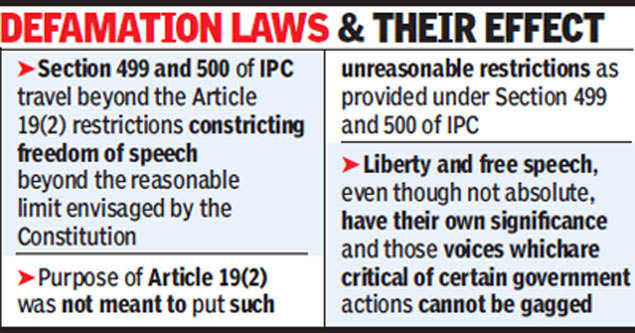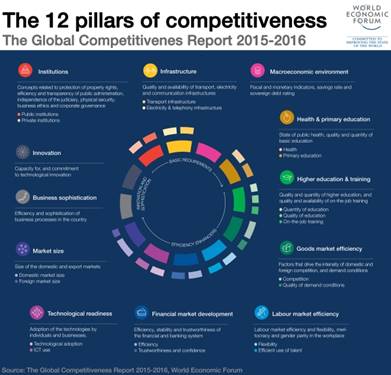



Rahul Gandhi appears before Surat court in defamation case
POLITY
Rahul Gandhi appears before Surat court in defamation case
Congress leader Rahul Gandhi arrived in Gujarat’s Surat to appear before a court in connection with a defamation case filed against him.
Defamation case in India :
- According to section 499 of IPC, whoever, by words either spoken or intended to be read, or by signs or by visible representations, makes or publishes any imputation concerning any person intending to harm, or knowing or having reason to believe that such imputation will harm, the reputation of such person, is said, except in the cases herein after expected, to defame that person.
- Section 500, which is on punishment for defamation, reads: “Whoever defames another shall be punished with simple imprisonment for a term which may extend to two years, or with fine, or with both.”
- Defamation is both civil and criminal in nature in India.
Difference between civil wrong and criminal wrong :
- Civil cases generally only result in monetary damages or orders to do or not do something. But a criminal case may involve both jail time and monetary punishments in the form of fines
- Criminal Crimes must generally be proved “beyond a reasonable doubt”, whereas civil cases are proved by lower standards of proof such as “the preponderance of the evidence.
Defamation cases under section 499 and 500 are challenged for their implicit nature of violation of freedom of speech.
Arguments against defamation cases :
- Under section 499 or 500 even truth doesn’t act as defence. The truth must serve a public good otherwise can be construed as defamation. This is an arbitrary and overbroad rule that deters people from making statements regarding politicians or political events even which they know to be true.
- A magistrate may issue criminal process on the mere allegation that the defendant conspired with the person who actually made the allegedly defamatory written statements. The person doesn’t need to make verbal or written statements.
- The person can be charged for making statements against a dead person even. Restricting speech to protect the reputation of the deceased is excessive and over-broad.

- A criminal suit can be filed even for a political speech which is most protected speech in democracy.
- In most liberal democracies, defamation cases are civil in nature not criminal.
- These sections are used by people to suppress the freedom of speech of a common man.
Arguments in support of defamation cases:
- The reputation of one cannot be allowed to be crucified at the altar of the other’s right of free speech.
- These sections seek to achieve balance between Article 19 and Article 21.
- These sections have implicit checks and balances to counter frivolous complaints. They undertake content as well context into consideration before declaring it as defamatory in nature.
- It puts burden to pursue complaint on the complainant than involving state machinery. It puts aside the state machinery.
- Mere abuse or misuse of the law cant be the reason to render it unconstitutional.
Supreme court view on it :
- Supreme court has upheld constitutionality of this provision.
- The court stated that notwithstanding the expansive and sweeping ambit of freedom of speech, like all rights, the right to freedom of speech and expression is “absolutely sacrosanct” but “is not absolute.”
- It also said that the reputation of a person is an integral part of the right to life granted under Article 21 of the Indian Constitution and it cannot be allowed to be crucified at the altar of the other’s right of free speech.
Wayforward:
- The offence of criminal defamation shall not be made out unless it has been proven that the impugned statements are false, that they were made with actual knowledge of falsity, or recklessness as to whether or not they were false, and that they were made with a specific intent to cause harm to the party claiming to be defamed.
- Public authorities, including police and public prosecutors, should take no part in the initiation or prosecution of criminal defamation cases, regardless of the status of the party claiming to have been defamed.
Reference : https://indianexpress.com/article/india/rahul-gandhi-modi-surname-defamation-case-surat-court-bjp-6061810/
ECONOMY
India drops 10 places on global competitive index, among the worst BRICS nations
India has dropped 10 positions, ranking 68 out of the 141 economies surveyed, in the World Economic Forum’s (WEF’s) Global Competitiveness Report for 2019.
Reasons behind India's poor performance:
- Poor performance in information and communication technology (ICT) adoption.
- Lack of diversity of workforce
- Poor encouragement to meritocracy.
- Lower skill capacity of workforce.
- One of the reasons for India’s drop, is that a number of other economies have performed way better.
- A number of similarly-placed economies including Colombia, South Africa and Turkey improved over the past year and hence have overtaken India.
Strength of India:
- Stable Market size where India performed at 3rd rank.
- At indicator of Financial stability, India ranked 40th. Financial system is relatively deep and stable despite the high delinquency rate (10 per cent of the loan portfolio, 106th), which contributes to weakening the soundness of its banking system (89th)
At innovative capability, India is ranked at 35th. In innovative capability , the report notes that India “does punch above its development status when it comes to innovation, which is well ahead of most emerging economies and on par with several advanced economies”.
Scope for improvement :
- Except for the four aforementioned indicators, India has performed poorly across all the remaining ones.

- India ranks 120th in ICT adoption, 110th in health, 107th in skills, 103rd in labour market and 101st in product market.
- Health conditions remain poor, as reflected in low healthy life expectancy (59.4 years, 109th), which is one of the shortest outside Africa and significantly below the South Asian average.
- Product market efficiency (101st) is undermined by a lack of trade openness (131st) and the labour market is characterised by a lack of worker rights’ protections, insufficiently developed active labour market policies and critically low participation of women (ratio of female workers to male workers of 128th)
- It ranks 59th in institutions, 69th in business dynamism, and 70th in infrastructure. Here also , it lies in the middle.
About global competitive report:
- It is published by world economic forum.
- It has 12 parameters and further sub parameters to judge the competency of a country.
Reference : https://www.google.com/amp/s/theprint.in/economy/india-drops-10-places-global-competitive-index/303410/amp/
SOCIETY
In Gujarat, 2 Dalit families convert to Buddhism, cite cancelled garba
Two Dalit families from Khambhisar village in Gujarat’s Aravalli district converted to Buddhism in the neighbouring Sabarkantha district, allegedly after the Patidar-dominated village cancelled garba celebrations as the Dalits had expressed wish to participate in the event.
Their arguments :
- If Gods and Goddesses existed, we would not have faced such discrimination. Hence my wife Urmila and I decided to embrace Buddhism, following into the footsteps of BabasahebAmbedkar.
- Discrimination was because of the caste-based hierarchy in Hindu religion. Hence, we decided to shun Hinduism and embrace Buddhism.
Universal Acceptance of Freedom of Religion:
- Every individual has a natural entitlement of religious faith and freedom of conscience, a right to adopt or abandoned any faith of his own choice.
- The freedom of religion and freedom of conscience has also been recognized under the international law.
- Freedom of religion and freedom of conscience is fundamental right both constitutionally and conventionally.
Constitution on freedom of religion :
Indian society has nourished and nurtured almost all the established religion of the world like Hinduism , Islam, Christianity, Buddhism, Jainism, Sikhism etc. from it s time immemorial.
- Article 25(1) states, “Subject to public order, morality and health and to the other provisions of this Part, all persons are equally entitled to freedom of conscience and the right freely to profess, practise and propagate religion
Religious conversion means adopting a new religion, a religion that is different from his previous religion or religion by his birth.
Reasons behind religious conversion :
- Conversion by force
- Conversion by offering better life. It means offering economic incentive for one to come out of the religion .
- Conversion for marriage.
- Conversion to escape the rigid hierarchical system caste system .
- Conversion by free will or free choice as the tenets of other religion appear more closer to person .
- Conversion to get reservation benefits
Anti -Conversion laws in India :
There is no pan India anti conversion law India. Some states have adopted their state specific anti conversion laws.
- Under these state laws, one is given a fixed time period before converting to another religion. It ensures that one doesn’t convert due to force.
Supreme court verdict on conversion :
- The freedom of religion enshrined in Article 25 is not guaranteed in respect of one religion only but covers all religions alike which can be properly enjoyed by a person if he exercises his right in a manner commensurate with the like freedom of persons following other religion.
- What is freedom for one is freedom for the other in equal measure and there can, therefore, be no such thing as a fundamental right to convert any person to one’s own religion.

© 2025 iasgyan. All right reserved